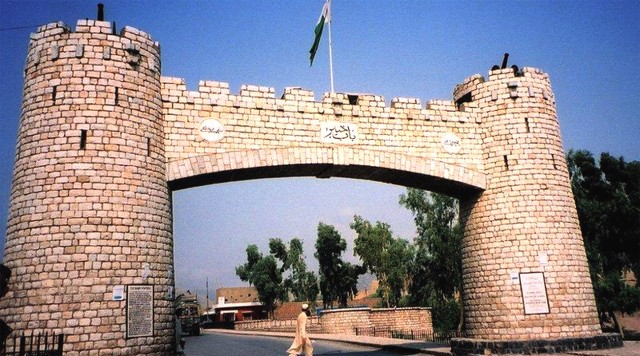
Peshawar was historically an open city. But what would once have been a leisurely stroll in the bazaars is now a covert operation in a well-guarded fortress. There are reinforced concrete walls, barbed wires, check points, sand bags and blast walls. And everywhere, there are security personnel.
To enter the city, one has to pass through the police check point on Grand Trunk Road and this sense of being watched, of constant surveillance gets worse as one delves deeper into the city.
The traditional emblem of a free democracy – the provincial assembly building situated on the junction of Sher Shah Suri Road and Khyber Road – is tucked away safe from the electorate behind huge blast walls, watch towers and a heavy mesh of barbed wire.
Try and veer off on to Police Road, which starts from Sher Shah Suri Road and passes in front of the Secretariat and Police Lines, and you’ll find your path blocked by a wall and barricades. The only way through is from the Khyber Road and then too, only if one is travelling in an official vehicle.
Close by are the district and sessions court buildings and the MPA hostel. After the suicide attack in the court complex last year, the area has been fenced off by barbed wires and sandbags. And encircling the MPA hostel are heavy blast walls and watch towers.
A minute’s walk away, the opening of Shahrah-e-Quaid-i-Azam near Governor House has been walled off and heavy barricades have been placed near the wall. After another 50 feet or so is the first ‘monument’ to the city’s recent history: the wall blocking off Sahibzada Abdul Qayyum Road which once linked Khyber Road with Sher Shah Suri Road was the first wall to go up. The Khyber Road opening of this road leads to the Governor House, Chief Minister House, the central police office and other important government installations. And obviously, entry is restricted.
Another road linking Sher Shah Road with Shahrah-e-Quaid-i-Azam has been blocked in front of Cantt Railway Station and entry to the same road from the Cantt side is also restricted. Hospital Road, where the US consulate is located, has been permanently closed for many years now and several other roads like Jhel Road, Tariq Road, Gunner Road, Baber Road and Michni Road also allow restricted access to the Cantt area from Khyber Road.
Keep walking and the feeling of being in a city under siege intensifies. Several other roads in Cantt areas close to the airport have also been closed off. Some months ago, Sahibzada Gul Road linking the Mall and Bara Road was blocked off with a wall; other roads including Rafique and Muneer Road allow restricted entry only. Meanwhile, a security check point has also cropped up on another road linking the same roads near Khyber House.
Key entry points on Warsak Road, Pishtakhara Chowk on Bara Road and Civil Quarters on Kohat Road near Cantt Railway Station are now the sites of huge barricades. The affluent residents of Hayatabad, meanwhile, have taken refuge behind gates as security check points and barricades have mushroomed across the city and highways.
The camaraderie and small-town feel of the heart of the city are long gone. The smaller bazaars of Andher Shaher (Interior City) including Meena Bazaar, Koochi Bazaar, and Kabari Bazaar behind Qissakhwani Bazaar have installed steel fences at entry and exit points. Necessary precaution, the locals were told, following a bomb blast in Kabari Bazaar in May last year.
Not to say that the security apparatus or government functionaries feel any safer. Police stations, courts, other government installations are all entangled in a mesh of barbed wire and sand bags. The state Life Building on Mall Road has scores of sandbags surrounding the building; even entry to the historic University of Peshawar campus is restricted.
“Living in Peshawar at present is like living in Beirut,” mourns columnist Younas Qiyasi. As the city adapts to its changed circumstances, few even notice the omnipresent walk-through gates and metal detectors. It’s not just the high-security installations; most offices and businesses boast the same.
And the corresponding loss of freedom chafes. “At every check point, your documents are checked; you’re interrogated about your identity, asked where you’re going and why,” says Qiyasi. “If the authorities had more faith in the abilities of the security apparatus, there may not have been so many walls and barriers,” he muses.
For now, all cultural and recreational activities have been banished from the city. “The city of flowers is now the city of thorns,” says Qiyasi. His tone carries a touch of irony and bitterness.
Published in The Express Tribune, July 2nd, 2010.

1725787935-0/Tribune-Pic-(19)1725787935-0-165x106.webp)
1725787075-0/Tribune-Pic-(18)1725787075-0-165x106.webp)

1725784957-0/Tribune-Pic-(17)1725784957-0-165x106.webp)

1725785195-0/Untitled-design-(6)1725785195-0-270x192.webp)
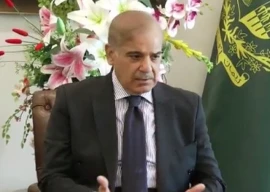
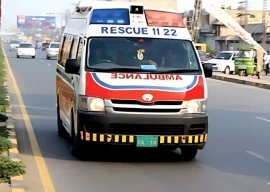




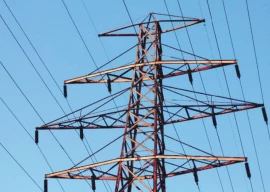
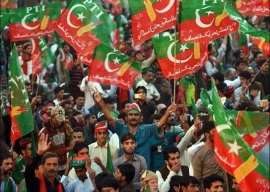
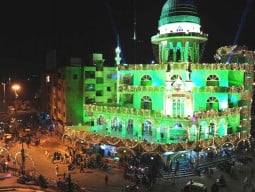







COMMENTS (4)
Comments are moderated and generally will be posted if they are on-topic and not abusive.
For more information, please see our Comments FAQ